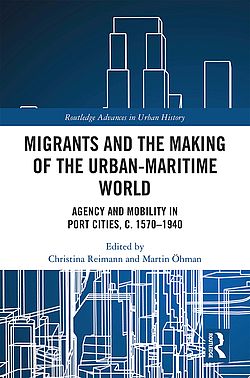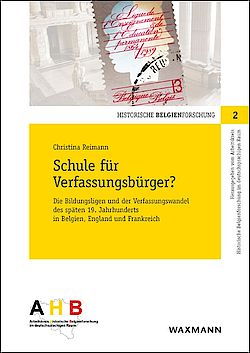Dr. Christina Reimann | Assoziierte Forscherin

Mutterinstitut
:
Universität Göteborg
|
Position
:
Assoziierte Forscherin
|
Fachbereich
:
Geschichte
|
Biographie
Nach einem Master in Geschichte und Politischer Theorie an Sciences Po Paris promovierte Christina Reimann 2014 an der Humboldt-Universität zu Berlin mit einer Arbeit zu Verfassungswandel und Bildungsreformen in Belgien, England und Frankreich im späten 19. Jahrhundert. Nach Postdoc-Stationen in Marburg, Mainz, Göteborg und Stockholm ist sie seit 2024 als Forscherin an der Universität Göteborg tätig.
In ihrer Forschung befasst sie sich mit Hafenstädten als komplexen Räumen des beschleunigten sozialen und kulturellen Wandels, als Portalen von Migration und globaler Vernetzung. Im Fokus standen zumeist die Hafenstädte Rotterdam und Antwerpen im späten 19. und frühen 20. Jahrhundert und derzeitiges Projekt befasst sich mit der Performany von Politik und Geschlecht in Le Havre und Göteborg zur Zwischenkriegszeit.
Christina hatte Lehraufträgen an der Humboldt-Universität und der Universität Marburg inne und war im Herbst 2023 Gastdozentin am deutsch-franösischen Campus von Sciences Po Paris in Nancy. Seit 2021 unterrichtet sie an der Universität Göteborg.
Stipendium
Promotionsstipendien: DFG-Graduiertenkolleg; FAZIT-Stiftung; Centre Marc Bloch
Forschungsthema
- Transnationale Geschichte Europas im 19. und 20. Jahrhundert
- Migrationsgeschichte
- Geschlechtergeschichte
- Stadtgeschichte, insbesondere von Hafenstädten
- Geschichte der Populärkultur
- Kultur- und Sozialgeschichte von Recht und Verfassungen
Titel der Dissertation
Schule für Verfassungsbürger? Die Bildungsligen und der Verfassungswandel des späten 19. Jahrhunderts in Belgien, England und Frankreich.
Zusammenfassung der Dissertation
Die Bildungsreformdebatten waren Teil des Verfassungswandels im späten 19. Jahrhundert: Mit diesen Debatten reagierten die bürgerlichen Gesellschaften auf den Legitimations- und Veränderungsdruck, die auf den Verfassungen lasteten, und trugen damit zugleich zur Dynamik des Verfassungswandels bei. Auf welche Weise dies geschah und welche Rolle organisierte gesellschaftliche Gruppen wie die Bildungsligen dabei spielten, ist Gegenstand dieses Bandes. Die Autorin analysiert den Verfassungswandel für den Zeitraum zwischen 1865 und 1904 als einen sozio-kulturellen Prozess und zeigt, wie sich der Wandel der bürgerlich-liberalen Verfassung als ein Wechselspiel zwischen emanzipatorischen und beharrenden Kräften entfaltete. Dazu untersucht sie die Bildungsdebatten in Belgien, England und Frankreich als Verfassungsdebatten und aus „verfassungskultureller“ Perspektive. In den Blick genommen werden die belgische und französische Ligue de l’enseignement, die englische National Education League sowie die National Education Association, die die Debatten ihres jeweiligen Landes maßgeblich prägten. Inwiefern trugen die Bildungsligen mit ihren Beiträgen zur Bildungsdebatte zum Verfassungswandel bei? Inwiefern waren sie an dem Legitimitätsverlust und der Beharrungskraft der Verfassungen beteiligt? Wie verfestigten sie die Ausschlussmechanismen der bürgerlich-liberalen Verfassung, und inwiefern trugen sie auch zu ihrer Überwindung bei?
Institution der Dissertation
Betreuer
Projekte
Seit 2024: ‘Body Eclectic: Visual media, Urban Space, and Renegotiation of Gender in Interwar Port Cities’, finanziert derzeit durch die Anna Ahrenberg Stiftung
2019–2023: Forscherin im HERA-project ‘Pleasurescapes. Port Cities’ Transnational Forces of Integration’
2019–2023: ‘Baltic Hospitality. Receiving and Rejection Strangers on the Northern Littoral 1000-1900’, zusammen mit Wojtek Jezierski, Sari Nauman, Leif Runefelt, funded by Östersjöstiftelsen
2015–2019: ‘Negotiations of Belonging in turn-of-the-century Western European Port Cities’
Organisation von Veranstaltungen
6 –7 March 2025 “Gender history and the visual archive. Discourse, practices, experiences (19th and 20th centuries) der Universität Göteborg, mit Christina Benninghaus (Universität Bielefeld),
22-24 April, 2020 Baltic Hospitality, Receiving Strangers / Providing Security on the Baltic Sea Coasts, c. 1000–1900 an der Södertörn University, Stockholm, mit Wojtek Jezierski ,Sari Nauman and Leif Runefelt
23–24 Nov 2017 ‘Port Cities and Migration in the Modern Era’ at the Centre for European Research an der Universität Göteborg (CERGU)
1–2 Okt 2015 ‘Migrations et frontières: La construction de frontières par des pratiques administratives et sociales (des années 1880 à nos jours)’ am Centre Marc Bloch, mit Irina Mützelburg und Gesine Wallem
Body Eclectic: Visual media, Urban Space, and Renegotiation of Gender in Interwar Port Cities
How did gender relations change in between the wars? The project approaches this historical question from a transnational urban perspective and shifts the focus from discourse to the embodiment of gender relations and their spatial anchoring. Combining visual and written sources, it examines the extent to which the gendered order of the urban space changed over the interwar period and how this transformation interacted with changing gender identities. The project investigates French Le Havre and Swedish Gothenburg because port cities are peculiar sites to study both the transnational dimension and the local contingencies of the renegotiation of gender in interwar Europe. I suggest that previous research on interwar gender history with its focus on national developments, the discursive dimension of gender renegotiation, and on the emergence of new female forms has not given sufficient recognition to the crucial way in which (everyday) urban bodily practices have forged gender identities and relations. Basing the analysis of interwar gender regimes on an in-depth study of documentary photographs and -films will allow to integrate the transformative power of bodily practices and -performances into the narrative on interwar gender history and produce an account of interwar urbanity that is more inclusive to those urban actors who are silent in the written source material.
The project challenges the usual national and metropolitan frame for studying interwar gender relations by examining urban places that are essentially constituted by and constitutive of transnational processes: port cities. Swedish Gothenburg and French Le Havre both were industrializing and internationally well-connected Atlantic port cities that hosted ethnically diverse populations with an important share of working-class people. Yet, the two cities were situated in very different legal, political and social interwar contexts, especially so when it comes to gender, which makes their parallel study particularly insightful.
My study uses photography, short documentary (city) films and newsreels considering that the increasing consumption of (moving) pictures affected people’s way of walking and moving in the city. On the historical background of metropolitan modern womanhood and the flourishing urban visual culture, I analyse the renegotiation of gender relations in Gothenburg and Le Havre via bodily practices with a threefold focus: on how people moved in, used and related to the public urban space; and on their poses and gestures when relating to one another. I pay close attention to clothing and accessories that are considered as major tools through which people express and transcend their gendered identities. I interpret bodily practices on the basis of existing research on the cultural history of gesture and mobility, and situate them historically and spatially by combining images and written sources.
Migrants and the Making of the Urban-Maritime World. Agency and Mobility in Port Cities, c. 1570–1940
03.September 2020Christina Reimann , Martin Öhmann (Ed.)
Collection: Routledge Advances in Urban History
ISBN: 9781003088950
This volume explores the mutually transformative relations between migrants and port cities. Throughout the ages of sail and steam, port cities served as nodes of long-distance transmissions and exchanges. Commercial goods, people, animals, seeds, bacteria and viruses; technological and scientific knowledge and fashions all arrived in, and moved through, these microcosms of the global. Migrants made vital contributions to the construction of the urban-maritime world in terms of the built environment, the particular sociocultural milieu, and contemporary representations of these spaces. Port cities, in turn, conditioned the lives of these mobile people, be they seafarers, traders, passers-through, or people in search of a new home. By focusing on migrants—their actions and how they were acted upon—the authors seek to capture the contradictions and complexities that characterized port cities: mobility and immobility, acceptance and rejection, nationalism and cosmopolitanism, diversity and homogeneity, segregation and interaction.
The book offers a wide geographical perspective, covering port cities on three continents. Its chapters deal with agency in a widened sense, considering the activities of individuals and collectives as well as the decisive impact of sailing and steamboats, trains, the built environment, goods or microbes in shaping urban-maritime spaces.
Hors-série de la revue Trajectoires: "Pratiques de frontière"
21.Juli 2017Irina Mützelburg , Christina Reimann , Gesine Wallem
Le Hors-série n°3 (2017) de la revue en ligne Trajectoires (CIERA) vient de paraître sous le titre:
Pratiques de frontière: Contrôle et mobilité en interaction de 1870 à nos jours
Praktiken der Grenzziehung: Wechselwirkungen zwischen Kontrolle und Mobilität von 1870 bis heute
Ce numéro a été coordonné par Irina Mützelburg, Dr. Christina Reimann et Gesine Wallem. Les contributions sont le fruit du Junges Forum organisé en octobre 2015 sur le thème « Migrations et frontières : La construction de frontières par des pratiques administratives et sociales (des années 1880 à nos jours) ».
Accès au dossier : https://trajectoires.revues.org/2338
Contenu du numéro:
- Irina Mützelburg, Christina Reimann et Gesine WallemPratiques de la frontière : Contrôle et mobilité en interaction de 1870 à nos jours. Introduction [Texte intégral]
- Sarah Frenking„Fast täglich ergehen von Seiten des Publikums Anfragen an mich, wo die Grenze sei.“ [Texte intégral]Die Konstruktion der deutsch-französischen Grenze vor Ort um 1900
- Inken BartelsDie Externalisierung der humanitären Grenze. [Texte intégral]Das Beispiel der ‚Unterstützung freiwilliger Rückkehr‘ durch die IOM in Marokko
- Aurélie AudevalLa spatialisation des identités assignées, Marseille 1940-1942 [Texte intégral]
- Jonathan MiazQui peut rester et qui doit partir ? [Texte intégral]Les frontières au prisme des usages sociaux du droit d’asile en Suisse
- Eva HallamaSeuchenmedizinische Praxis in nationalsozialistischen „Grenzentlausungslagern“
- Jérémy GeeraertLes frontières à géométrie variable de la citoyenneté. Accès aux soins des migrants dans un dispositif d’assistance [Texte intégral]
Schule für Verfassungsbürger? Die Bildungsligen und der Verfassungswandel des späten 19. Jahrhunderts in Belgien, England und Frankreich
01.Juli 2016Christina Reimann
Collection: Historische Belgienforschung
ISBN: 978-3-8309-3476-9
Die Bildungsreformdebatten waren Teil des Verfassungswandels im späten 19. Jahrhundert: Mit diesen Debatten reagierten die bürgerlichen Gesellschaften auf den Legitimations- und Veränderungsdruck, die auf den Verfassungen lasteten, und trugen damit zugleich zur Dynamik des Verfassungswandels bei. Auf welche Weise dies geschah und welche Rolle organisierte gesellschaftliche Gruppen wie die Bildungsligen dabei spielten, ist Gegenstand dieses Bandes.
Die Autorin analysiert den Verfassungswandel für den Zeitraum zwischen 1865 und 1904 als einen sozio-kulturellen Prozess und zeigt, wie sich der Wandel der bürgerlich-liberalen Verfassung als ein Wechselspiel zwischen emanzipatorischen und beharrenden Kräften entfaltete. Dazu untersucht sie die Bildungsdebatten in Belgien, England und Frankreich als Verfassungsdebatten und aus „verfassungskultureller“ Perspektive. In den Blick genommen werden die belgische und französische Ligue de l’enseignement, die englische National Education League sowie die National Education Association, die die Debatten ihres jeweiligen Landes maßgeblich prägten. Inwiefern trugen die Bildungsligen mit ihren Beiträgen zur Bildungsdebatte zum Verfassungswandel bei? Wie verfestigten sie die Ausschlussmechanismen der bürgerlich-liberalen Verfassung, und inwiefern trugen sie auch zu ihrer Überwindung bei? Welche Rolle spielte dabei die transnationale Verflechtung der Ligen?
Mehr Information hier.
Autoreninfo
Postdoktorandin am Centre Marc Bloch und assoziierte Forscherin am deutschfranzösischen Verbundprojekt „Saisir l’Europe“, studierte Geschichte und Politische Theorie an Sciences Po Paris und an der University of Kent, Canterbury. Sie war DFG-Stipendiatin im Graduiertenkolleg „Verfassung jenseits des Staates“ der Humboldt-Universität zu Berlin und wurde dort 2014 promoviert. Forschungsschwerpunkte: Kultur- und Sozialgeschichte des Rechts; transnationale Geschichte Westeuropas im 19. und 20. Jahrhundert. Im Wintersemester 2015/16 ist sie Visiting Fellow am SFB/TRR „Dynamiken der Sicherheit. Formen der Versicherheitlichung in historischer Perspektive“ an der Philipps-Universität Marburg.
Publikationen
I. Monograph
1.Schule für Verfassungsbürger? Die Bildungsligen und der Verfassungswandel des späten 19. Jahrhunderts in Belgien, England und Frankreich, Münster/New York: Waxmann, 2016.
II. Editing work
2. Sari Nauman, Wojtek Jezierski, Christina Reimann, Leif Runefelt (eds), Baltic Hospitality: Receiving Strangers & Providing Security in North-Eastern Europe, c. 1000–1900, Palgrave Macmillan, 2022.
3. Lisa Kosok, Paul van de Laar, Judit Vidiella Pagès, Alina L. Just, Christina Reimann and Aurelio Castro-Varela (eds), ‘Pleasurescapes on the edge. Performing modernity on urban waterfronts (1880s-1960s)’, Journal of Urban History, vol. 48, Issue 6, 2022.
4. Christina Reimann, Martin Öhman (eds), Migrants and the Making of the Urban-Maritime World. Agency and Mobility in Port Cities, c. 1570–1940, London/New York: Routledge/Taylor & Francis, 2020.
5. Irina Mützelburg, Christina Reimann, Gesine Wallem (eds), ‘Pratiques de frontière. Contrôle et mobilité en interaction de 1870 à nos jours’, Trajectoires, Special Issue 3, 2017.
III. Peer-reviewed journal articles
6. ‘Talk about emigration and you will always interest many Antwerp residents.’ Newspaper representations of port related human mobility in turn-of-the-century port cities, under review at Journal of Modern European History
7. ‘Resilient Forces of Public Amusement. The Negotiation of ‘Urban Modernity’ in a Peripheral Port City (1880s–1930s)’, Urban History 2025. (Open Access)
8. ‘Manoeuvring Urban Spaces In-between Public and Private: Women’s Lived Experiences of Early-twentieth-century Gothenburg, Immigrants & Minorities, 42 (1) 2024, 83–110. (Open Access)
9. ‘Amusement Leaves the Port: Pleasure Institutions and the Reshaping of Gothenburg’s Material and Nonmaterial Borders, 1860s–1923’, Journal of Urban History, 48 (6) 2022, 1211–1229. (Open Access)
10. ‘”Behaviour and Morality have Remained Irreproachable, and his Commercial Reputation is Good.” Applying for Naturalisation in Late-Nineteenth-Century Rotterdam and Antwerp’, Low Countries Historical Review (BMGN) 136 (3) 2021, 3–30. (Open Access)
11. ‘People on Lists in Port Cities: Administrative Migration Control in Antwerp and Rotterdam (c. 1880–1914)’, Journal of Migration History 6 (2) 2020, 182–208.
12. ‘Soziale Sicherungssysteme als Bewältigung des Raums? Rotterdam und Antwerpen im späten 19. und frühen 20. Jahrhundert’, Saeculum. Jahrbuch für Universalgeschichte, 68 (1) 2018, 61–88.
13. ‘Die Bildungsdebatten im Wandel der bürgerlich-liberalen Verfassung in England und Belgien im späten 19. Jahrhundert‘, Jahrbuch zur Liberalismus-Forschung 29, 2017, 167–191.
IV. Book chapters
14. ‘Theatre and the making of the welfare city. An urban history of Gothenburg’s performance scenes, ca. 1880–1950’, in: Magnus Linnarsson and Mats Hallenberg (eds), Nordic Welfare Cities: Negotiating Urban Citizenship since 1850, Routledge, 2024, 60–82. (Open Access, peer-reviewed)
15. ‘Registrieren, Einbürgern, Unterbringen. Umgang mit Migration in Antwerpen und Rotterdam im frühen Dampfzeitalter (ca. 1880–1914), in: Sebastian Bischoff et al., Belgien, Deutschland und die ‚Anderen‘. Bilder, Diskurse und Praktiken von Diskriminierung, Ausgrenzung und Verfolgung, Münster/New York: Waxmann, 2024, 217–228. (editor reviewed)
16. ‘Hospitality and Securitization in Times of Cholera: Eastern European Migrants in Rotterdam and Antwerp (c.1880-1914)’, in: Nauman, Jezierski, Reimann, Runefelt (eds), Baltic Hospitality: Receiving Strangers & Providing Security in North-Eastern Europe, c. 1000–1900, Palgrave Macmillan, 2022, 359-386. (peer-reviewed)
17. W. Jezierski, S. Nauman, C. Reimann, L. Runefelt, ‘Introduction. Baltic Hospitality, 1000-1900’, in: Nauman, Jezierski, Reimann, Runefelt (eds), Baltic Hospitality: Receiving Strangers & Providing Security in North-Eastern Europe, c. 1000-1900, Palgrave Macmillan, 2022, 1-29. (Open Access, peer-reviewed)
Personal contribution: I wrote the passages on the concept of securitization and did the final editing.
18. ‘Die Anfänge des Sozialstaates vom Rande aus betrachtet. Soziale Sicherheit in den Hafenstädten Antwerpen und Rotterdam um 1900‘, in: Bischoff et al. (eds), „Mit Belgien ist das so eine Sache". Resultate und Perspektiven der Historischen Belgienforschung, Münster/New York: Waxmann, 2021, 159–170. (editor-reviewed)
19. Christina Reimann, Martin Öhman, ‘Introduction’, in: Reimann, Öhman (eds), Migrants and the Making of the Urban-Maritime World. Agency and Mobility in Port Cities, c. 1570–1940, London/New York:Routledge/Taylor & Francis, 2020, 1–16. (peer-reviewed)
Personal contribution: I wrote the first draft of the introduction that we worked-over and expanded in a concerted manner.
20. ‘Advertising and the Rule of Law. Law in Representation of Insurance in Late 19th Century Netherlands’, in: Minale and Amorosi (eds), History of Law and Other Humanities: Views of the Legal World Across the Time, Madrid: Universidad Carlo III de Madrid, Serie de Monografías del Derecho, 2019, 457–470. (editor reviewed)
21. ‘Putting the Rural World on the Road of Progress? Experiences of Failure by Local Activists of the Belgian Education League (c. 1865–1884)’, in: De Spiegeleer/Liberaal Archief (eds), The Civilising Offensive. Social and Educational Reform in 19th Century Belgium, Berlin: DeGruyter Oldenbourg, 2018, 103–130. (Open Access, peer-reviewed)
22. ‘Multiple Sources of Law and Socio-Cultural Boundaries: Social Insurance in the Port Cities of Antwerp and Rotterdam around 1900’, in: Katacevic et al. (eds), History of Legal Sources: The changing Structure of Law, Belgrade: University of Belgrade/Faculty of Law Publishing, 2018, 153–164. (editor reviewed)
23. ‘Zwischen Verfassungskrise und Verfassungskult: Der Verfassungswandel in Belgin im späten 19. Jahrhundert’, in: Bischoff et al. (eds), „Belgium is a beautiful city“? Resultate und Perspektiven der Historischen Belgienforschung, Münster/New York: Waxmann, 2018, 43–54. (editor reviewed)
24. Irina Mützelburg, Christina Reimann, Gesine Wallem, ‘Introduction: Pratiques de frontière. Contrôle et mobilité en interaction de 1870 à nos jours’, Trajectoires, Special Issue 3, 2017, 13p. (editor-reviewed)
I wrote the passages about the conceptualization of borders and boundaries in historical research.
25. ‘Der belgische „Schulkrieg“: Ort gesellschaftlicher Spannungslinien und transnationaler Verflechtungen’, in: Bischoff et al. (eds), Belgica – terra incognita? Resultate und Perspektiven der historischen Belgienforschung im deutschsprachigen Raum, Münster/New York: Waxmann, 2016, 34–43. (editor-reviewed)
26. ‘L'hybridation des pratiques politiques européennes’, in: Charrier et al. (eds), Circulations et réseaux transnationaux en Europe (XVIII-XXe siècles). Acteurs, pratiques, modèles, Bern: Peter Lang, 2013, 117–130. (editor-reviewed)
V. Reviews
27. Antje Dietze and Alexander Vari (eds), Urban Popular Culture and Entertainment. Experiences from Northern, East-Central, and Southern-Europe, 1870s–1930s, Nordic Theatre Studies, forthcoming.
28. Natalia Bloch and Kathleen M. Adams (eds), Intersections of Tourism, Migration, and Exile, 2022, Journal of Tourism History, vol. 16 (3), 2024.
29. Ellen Debackere, Welkom in Antwerpen? Het Antwerpse vreemdelingenbeleid, 1830–1880, 2020, Low Countries Historical Journal (BMGN), vol. 137, 2022.
30. Alice Kessler-Harris, Maurizio Vaudagna (eds.), Democracy and the Welfare State. The Two Wests in the Age of Austerity, 2018, Francia-Recensio 2019/4.
31. Verena Peters, Der “germanische” Code Civil. Zur Wahrnehmung des Code Civil in den Diskussionen der deutschen Öffentlichkeit, 2018, H-Soz-Kult, 23/03/2019.
32. Peter Collin (ed.), Justice without the State within the State. Judicial Self-Regulation in the Past and Present, 2016, Neue Politische Literatur, 2018:1.
33. Brad Beaven, Karl Bell, Robert James (eds), Port Towns and Urban Cultures. International Histories of the Waterfront, c. 1700–2000, 2016, H-Soz-Kult, 10/08/2017.
34. Detlef Lehnert (ed.), Konstitutionalismus in Europa. Entwicklung und Interpretation, Francia-Recensio 2016/3.
35. Michael Fisch, Werke und Freuden. Michel Foucault–eine Biografie, Francia-Recensio 2015/4.
VI. Other scientific publications
36. (blog-post) ‘The port city of Gothenburg as performance ground for the women’s suffrage movement’, PortCityFutures Blog, https://www.portcityfutures.nl/news/the-port-city-of-gothenburg-as-performance-ground-for-the-womens-suffrage-movement, 2023.
37. (translation together with Irina Mützelburg) Catherine Goussef, ‘Vom Krieg erzwungen oder historisch gewachsen? Die Bug-San-Linie als vertikale Scheidelinie im östlichen Europa‘, in: Aldenhoff et al.(eds.), Europa vertikal. Zur Ost-West-Gliederung im 19. und 20. Jahrhundert (Göttingen, Wallstein, 2016).
38. (conference review) ‘Das lange 19. Jahrhundert: Neuere Forschungen und Forschungsperspektiven‘, H-Soz-Kult, 26/05/2016.
39. (blog-post) ‘National integration vs. Transnationalism: A micro-study of legal practice concerning migrants' social security in late 19th century port cities’, Etat social-Sozialstaat, http://www.europa-als-herausforderung.eu/de/teilprojekte/sozialstaat, 2015.
40. (conference review) ‘Migration und Grenzen. Grenzkonstruktion als soziale und administrative Praxis von 1880 bis heute‘, H-Soz-Kult, 23/11/2015.
41. (translation French-German) José Woehrling, ‘Die Auswirkungen der Anwendung der Kanadischen Charta der Rechte und Freiheiten auf das politische und demokratische Leben sowie auf das Gleichgewicht des föderalen Systems‘, in: Gagnon/Sturm (eds), Föderalismus als Verfassungsrealität: Deutschland und Kanada im Vergleich, Baden-Baden, Nomos, 2011.
Publikationen als PDF


